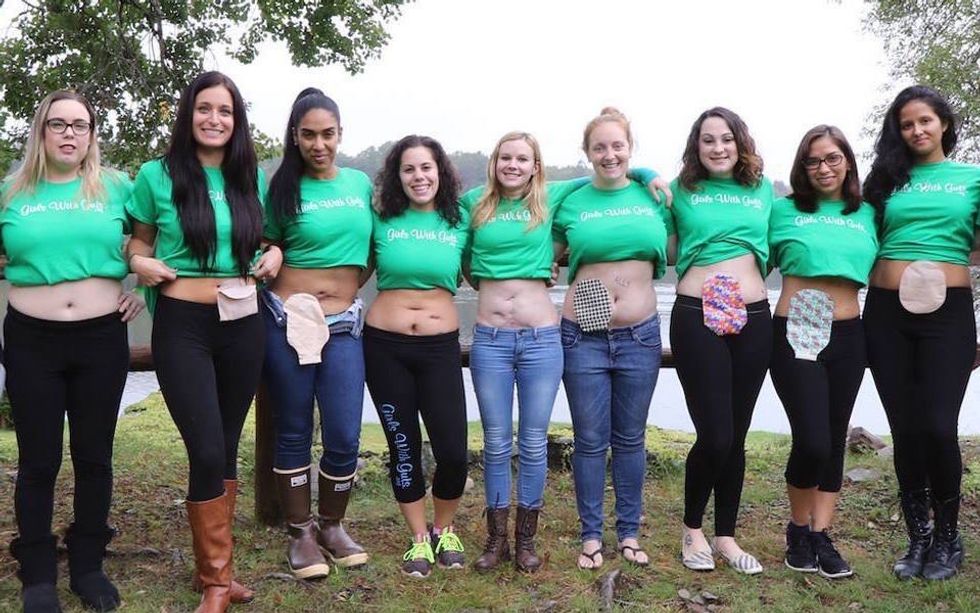As Crohn’s and Colitis Awareness Week comes to a close, I feel compelled to try and advocate for a disease that not many people know about. At age 14, I was diagnosed with a category of Inflammatory Bowel Disease called Ulcerative Colitis. It is a chronic autoimmune disease that causes inflammation in the colon and then leads to the development of tiny open sores or ulcers along the lining of the colon. When I was diagnosed, I had no idea what my disease even was, and although most people don’t even realize, about 1.6 million people in America are affected by IBD. Once I was diagnosed, it was like every time I turned around, I met someone new who was affected by IBD. Although I know a lot about my disease now, I still don’t know everything there is to know. I’m still learning about my disease every day, and every new person’s story that I meet or read educates me just a little bit more on this lifelong disease. Here are 7 things that I learned after diagnosis, and that most people don’t know about this chronic autoimmune disease.
1. Although this disease affects our insides, it affects us on the outside as well.
There are a lot of days when I just don’t want to get out of bed. Now, I know a lot of people say that on a daily basis: “I didn’t get a lot of sleep last night” or “I’m so exhausted from work today”. But, for patients with IBD, it’s not the same as just not getting a good night’s sleep. People who are diagnosed with IBD are more at risk to be diagnosed with anemia, or iron deficiency, from the lack of their body’s ability to absorb key nutrients and vitamins, or from the continuous blood loss that pairs with being diagnosed with Crohn’s or Colitis. The lack of blood and the lack of nutrients result in little to no energy, therefore making the patient feel tired and wanting to sleep. When I was at my most ill, I was diagnosed with anemia, and it felt like I couldn’t get enough sleep. I was falling asleep on my porch outside while reading a book, coming home after school and immediately going to take a nap, and sleeping for 12-13 hour periods at a time on the weekends. It also makes it hard to function when you’re getting crippling pains running through your stomach. Another unfortunate side-effect of IBD is abdominal pain. Excruciating abdominal pain. It feels as though a knife is ripping your abdomen apart, and it becomes really hard to function normally and fake an “I’m okay” smile when your intestines feel like they’re trying to jump out of your body.
2. Taking medication becomes a part of who you are.
Unfortunately, the only way to keep this disease at bay is to combat it with medications. I personally average 8-10 pills a day and I get a Remicade infusion every 8 weeks (Remicade is a drug that is given through an IV and it helps reduce signs and symptoms and induce and maintain remission in patients with Crohn’s and Colitis). But, every patient is different, and I know people who barely take any medication at all, and I also know people who take a lot more medication than I do. Regardless of which type of IBD you are diagnosed with, the amount of medication really depends on the severity of your inflammation, and taking meds is really the only way to keep said inflammation from constantly flaring up.
3. This disease can be mild, but it can also take your life.
I’ve heard a lot of horror stories since being diagnosed with UC: stories about patients being hospitalized for up to six months at a time, needing emergency surgeries, and even not being correctly diagnosed by their doctors. I personally had a potentially fatal flare-up that landed me in the hospital, and if I hadn’t gone into the hospital there was a very large chance that my body would’ve eventually just shut down on me. When the idea of putting me on Remicade came up, my mother was very hesitant to agree to it because one of the drug’s very rare yet very dangerous side effects is Lymphoma. At the time, we had known someone whose daughter had Crohn’s and died from complications with Remicade and another medication, so I don’t blame her for being worried. It was a lot to take in, knowing that something so scary could be a possibility, but I had to accept the small chance of that happening, and I had to accept that this disease was my life now.
4. Living with this disease changes your lifestyle, A LOT.
Post-diagnosis, and even post-hospitalization, living with UC was a huge adjustment. I had to get used to waking up every morning and remembering to take my meds, and remembering to take them before I went to bed. I had to take supplements for my iron deficiency, take vitamins to compensate for my body’s lack of absorption abilities, and I had to gain back all of the muscle that I lost from being sick for 2 months and bed-ridden for 10 days. I also just had to adjust the way I lived my life in general. I could no longer share food or drinks with my friends because my immune system was compromised from the Remicade. I had to be okay with canceling plans last minute if I wasn’t feeling good. I had to get used to carrying around Tums just in case my stomach started to act up and I was out of the house. I had to get used to the fact that I had to work twice as hard to maintain my strength and my endurance, but only had half the amount of energy that I used to to do so. I had to get used to the toll that UC physically took on my body, too. I had to get used to the fact that my metabolism was not as fast as it used to be, and I couldn’t just eat whatever I want and not gain weight. I had to get used to the fact that I have stretch marks all over my back and my legs and that whenever I go to the beach, people are always going to stare at me. And mostly, I just had to get used to the fact that this is never going away, and that this is going to be a part of my life until the day that I die.
5. Having a good doctor makes a difference.
Just like I have heard horror stories about extreme flare-up cases, I’ve also heard some horror stories about patients having terrible doctors. Patients not being diagnosed correctly, doctors missing things upon examination, or doctors just not listening to their patients and what they want. Although our doctors are professionals and they do know best, it is our body and we can usually tell when something is off and when something needs to be done. I am so thankful that I have such a great doctor. He is so open-minded when it comes to my symptoms and will always talk to me about what he wants to do in terms of treatment and medication before he just decides on anything. It’s going to be hard to leave such an understanding and amazing doctor when I’m too old to go to a pediatric hospital anymore, but, hopefully, I can find an adult doctor that’s just as incredible as he is.
6. IBD is mostly physical but can affect patients mentally, too.
IBD is a mental game just as much as it is a physical game. Patients have to be mentally strong enough to be with okay with the fact that their own body is basically trying to destroy itself. We have to be okay with people making comments about how we should “change our diets” or “think more positively” because “it’s all in our heads”. We have to be okay with the fact that our bodies will never be the same. And sometimes, it’s okay not to be okay. I will admit that I considered suicide at a point. Before going into the hospital, I knew my body was basically giving up on me. At that point, my thought process was: “If I’m gonna die anyway, why don’t I just end it now?” I didn’t have a life. All I was doing was sleeping, forcing myself to eat, and going to doctor’s appointments. But when I started to get better, I started to see a light at the end of the tunnel. Although I’m not okay all the time, and there are going to be days where I’m going to hate the situation I’m in, I keep reminding myself that life could always be worse. As of right now, I am healthy, I am able to go to school, and I have family and friends that love me, and sometimes, that’s just enough to remind that I really am blessed, despite my situation.
7. Most people don’t know what you’re going through, but it’s still nice to have a really loving support system.
I told three people that I was in the hospital the first night that I went in; ironically enough, I am no longer friends with any of the three people that I initially told. Of course, my family knew and sent balloons and get-well cards (my godmother sent me an especially large cat stuffed animal and it’s still on my bed in my room). Two of my neighbors, who are basically like my sisters, just showed up one day when my dad brought them to the hospital. Other than the select people that were told, no one else knew I was in the hospital. For months, I just told people I was “sick” and that I was home. But, after a while, I stopped hiding the fact that I was sick and embraced the fact that I was stronger than my disease. I am so thankful for the family and friends in my life who have accepted me despite my illness. They never shied away because they thought I was contagious, they never got grossed out or thought I was gross when I explained what UC is, and they still make me feel loved when I don’t love myself. I know there’s a whole community of people who know what I’m going through, and I know that they will always be there when I want to rant to someone who understands what it’s like, but sometimes it’s nice to have people in your life that are able to make you forget you’re even sick at all.
Ultimately, I know that when it comes to IBD I am no expert. There are people I know who have been living with IBD twice as long as I have, and some people I know who have been living with IBD for 40+ years! There are patients who have had it so much worse than me, have gone through so many more doctors than I have, and just know more based upon experience. But, I hope that anyone who has read this knows a little bit more about what one person out of millions of people go through every day. I cannot speak for the entire IBD community when talking about my disease because everyone is different and everyone goes through their own experiences, but I do know for a fact that a goal for everyone who is a part of the IBD community it to make #IBDvisible. That’s what Awareness Week is about: it’s about advocating and educating people about a disease that some people don’t even know exists. It’s about making our voices heard and trying to increase research so that one day there is a cure for IBD. I’m not sure if they will ever find a cure within my lifetime, but until that day comes, I will continue to try and teach people about IBD, and I will always be fighting to make IBD visible.





















